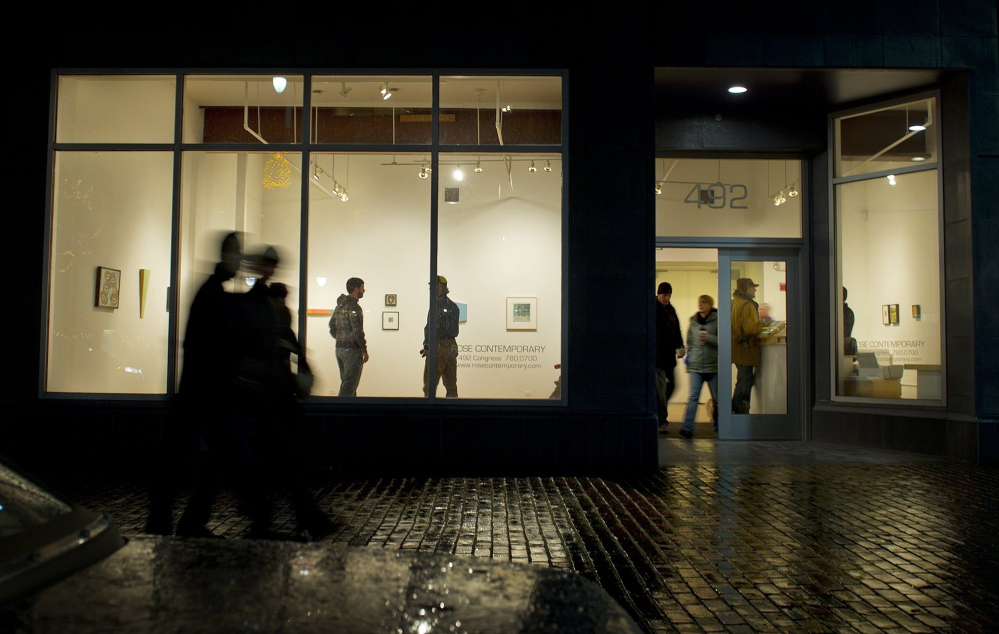The City Council voted Monday to once again close Congress Street for the First Friday Art Walk in June, but not before several councilors voiced concerns about how a similar closure in December caused gridlock.
“The December closure was a disaster and the streets were barely used,” City Councilor Kevin Donoghue said.
Portland’s appeal as a place to gather and party is fueling an increase in the number of outdoor festivals and events, including the monthly art walk that fills Congress Street with exhibitors and pedestrians. But it was clear Monday that city officials walk a tightrope when it comes to closing city streets for festivals while at the same time trying to keep traffic and mass transit moving.
The traffic problems in December also were likely made worse by other events that coincided with the First Friday Art Walk.
About 250 people gathered on Congress Street that evening as part of a national protest that followed incidents in other states in which juries decided not to indict white police officers who killed black men. The group chanted and marched from Congress to Spring Street, where they laid down in the road and blocked traffic. At the same time, a choir was singing Christmas carols and entertaining a group that had gathered for a tree lighting near the Museum of Art.
Congress Street was first closed for a First Friday Art Walk in December 2013. It was closed again in June 2014 and revelers filled the streets.
Steve Hewins, president of the Portland Downtown District, a trade group of local businesses, said the June event was an “unqualified success,” with more than 25,000 people participating and many local businesses reporting record sales.
But those closures, as well as one in December, force Portland Metro to alter its bus routes. As a result, the bus did not provide reliable service at a time when it is trying to increase ridership.
Metro Director Greg Jordan said Tuesday that buses were delayed by 10 to 20 minutes in December. Other events that close roadways and force detours throughout the year also disrupt service, affecting commuters and the bus service’s reputation, he said.
“It does erode our efforts to build a more reliable system,” Jordan said. “The art walk is a major event and we want to help make it successful, but there are tons of other events throughout the year that detour transit. Any one event might not be a big deal, but taken together over the course of a year, it does affect (riders’) lives.”
As part of the first road closure in 2013, the council directed city staff to work with Metro to draft a formal agreement about how street closures would be handled to minimize the impact on bus service.
Acting City Manager Sheila Hill-Christian said Monday those talks broke down because finding a way to close a main traffic arterial on Friday night in the middle of summer without reducing bus service was practically impossible. Congress Street averages more than 10,000 vehicles a day.
Hill-Christian said staff would again talk with Metro, but suggested that, at some point, the council would have to make a policy decision.
“It’s going to be difficult without some policy direction about what’s our priority: Those major festivals and events or not disrupting service,” she said.
Public Services Director Michael Bobinsky said the December delays were exacerbated by a utility issue and an event at Merrill Auditorium.
Bobinsky said staff will try to produce a memorandum of understanding for the road closure by late May. Meanwhile, to avoid congestion on June 5, the road won’t close until 6 p.m., as opposed to 5 p.m., to avoid the rush hour, he said, and there will be better signage. Also, access to the Elm Street bus station will also be preserved, he said.
“We are confident that situation will not be repeated,” he said.
Donoghue, who serves on the Metro board, said the closure jeopardizes the city’s entire transportation system, including for cars.
“It’s about the viability of our transportation system, which includes many modes,” Donoghue said. “To my mind we really gut the effectiveness of that system when we shut down our main street on a Friday night in the peak of summer.”
Send questions/comments to the editors.



